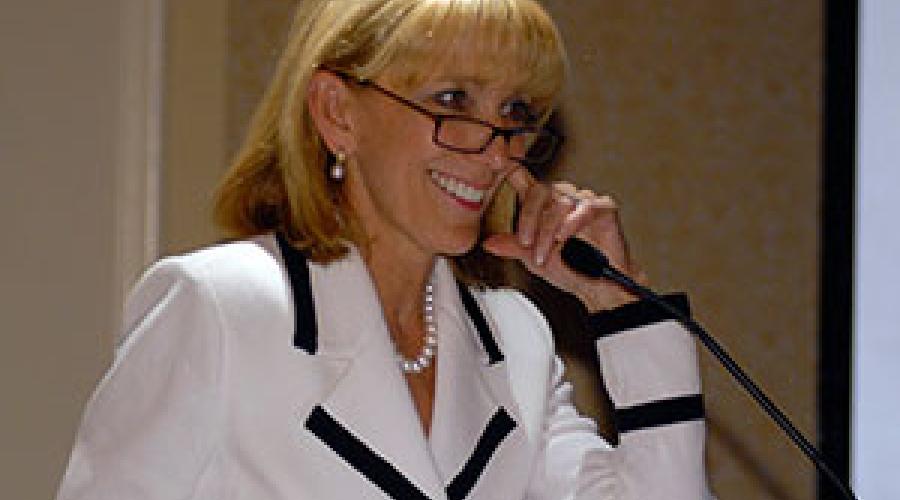
Having Impact
Waiting to board a British Airways flight from Luanda, Angola, to London in 2008, Jean Baderschneider Ph.D. '78 caught the gaze of a nervous young girl traveling with an older man who held her tightly in the crook of his arm.
By the time they all boarded the plane, "I realized something was terribly wrong." That "something" was a case of human trafficking, said Baderschneider, determined to stop it.
Being honored Thursday with ILR's Alpern Award, the ExxonMobil vice president began a journey that started with talking to the pilot and other airline officials, the U.S. State Department and the United Nations. She also contacted private investigators in the United States and the United Kingdom.
No one had the power to intervene.
Baderschneider finally found a non-governmental organization, Polaris Project, to help track the girl, who disappeared from sight when the plane landed.
"We never found her," said Baderschneider, who discovered her next career through that experience.
Retiring from ExxonMobil, she is devoting her skills to the global fight against human trafficking. She chairs the National Leadership Council of the Polaris Project and is an active board member of End Human Trafficking Now, based in Geneva, Switzerland, and focused on helping businesses and corporations ensure their supply chains are free of slavery.
Polaris is located in Washington, D.C., and works to combat modern-day slavery through legislation, policies and victim services. Through its toll-free hotline, Polaris responded to nearly 17,000 trafficking calls in 2012.
Through her work, Baderschneider is driving the development of a global response network and serious market analysis, understanding and intervention to stop sex and labor trafficking.
"In this third era of my life, I'm trading on everything I learned at the ILR School. ILR provided a great set of conceptual and analytical skills grounded in both quantitative and qualitative ways to assess issues. ILR is an incubator for analyzing issues from all perspectives and establishing concrete, real-world solutions."
ILR's doctoral program, she said, "provided a unique concentration of committed and interesting people" and a rich environment of diverse thinking and approaches.
"I was struck by how everyone used all their experiences to inform their work. I learned to draw on all aspects of my life. I learned, as one of my professors use to say, 'to bring all of me through the door.'"
The ILR experience was very empowering, Baderschneider said. "When I left, my mindset was always have an impact."
When Baderschneider arrived at Cornell with a fresh University of Michigan master's degree with a concentration in labor relations she was behind the wheel of a U-Haul truck.
She parked next to Sage Hall, where she had been told there was a bulletin board filled with apartments for rent and people looking for roommates. She found both, but slept in the truck her first night in Ithaca.
"My life's been filled with some best-laid plans and serendipity" and memorable ILR professors like Sam Bacharach and the late John Windmuller, Baderschneider said.
"ILR taught me so many things," she said, naming ILR professors.
"Ron Ehrenberg, oh my gosh. He was just funny and fun and smart, quick smart. He was always challenging everything … you had to be on your toes."
Tom Kochan, who chaired Baderschneider's committee and now teaches at MIT, "was serious and grounded and enabled so much."
"Jean McKelvey – she was a role model before we thought about role models ... I don't think I ever had anybody empower me so much … I still have a paper I wrote for her. Her note back to me covered a whole page."
When Professor Maurice Neufeld asked her to live in his Tudor-style house for a summer, Baderschneider recalls him asking if she knew how to garden.
She laughs, remembering her reply, "My grandparents were farmers." The reality? "I had never gardened in my life."
The night before Baderschneider defended her thesis, she remembers pulling weeds by flashlight, lest Neufeld and his wife, Hinda, return to an overrun garden.
Baderschneider, now a member of the ILR Advisory Council and the President's Council of Cornell Women, was on her way to a job interview when snow stranded her in Chicago.
Serendipity struck again.
John Baitsell, a Mobil executive who had given a talk at ILR, recognized Baderschneider in the crowded airport. They sat on the floor and chatted for hours. By the time the snow stopped, Baitsell convinced Baderschneider that she should work for Mobil.
At Mobil, she rose quickly through the ranks. Baderschneider was the first female refinery manager and had secured a place at the top after completing a series of projects that tapped into analysis and problem-solving skills developed at ILR.
She worked in a variety of roles, from marketing to refining to exploration and production, then ran a major corporate reorganization that included a series of recommendations related to establishing a global procurement, logistics and supply chain operation. At the end of the project, the chairman said, "Now, go run it."
Baderschneider was in charge of hundreds of billions of dollars of purchases across the globe. Her job took her to more than 100 countries.
As she transitions from ExxonMobil into the fight against human trafficking, Baderschneider said she will continue to get up in the morning, go for a run, then use her energy and skills to have an impact.
"I will never retire."


